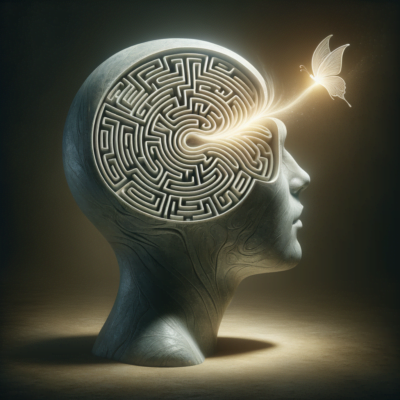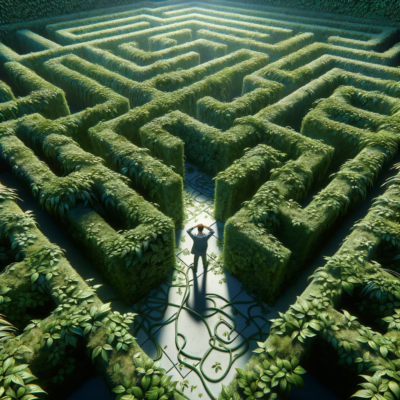Finding Inspiration for the New Year
The New Year reached to calendars recently, and I immediately thought, “Awesome! The New Year’s Resolutions might be a great topic to write about!” Meantime, some of my friends and colleagues asked me about my New Year’s resolution. To their big surprise, I calmly explained that making those resolutions is not really in my nature.

In my typical way, spontaneously throughout the year when I feel something is out of sync — my built-in spontaneous self-regulating mechanism of introspection kicks in.
Great, you thought, perhaps not very reassuring, seeing such a spontaneous person, not planning ahead, trying to make stuff up… And yes, I thought the same question. So I went deeper into reflecting on my own thinking. How disingenuous would it be to write about something I don’t even do myself? As is typical for me, I kept pondering and wondering, getting onto something, yet I have struggled to put that into words.
Yet, as we set the sails of our future towards liberty and fulfilment in life by starting this blog together, we have both noticed some synchronicities around the topic of freedom lately. Picking a goal ultimately brings one’s attention onto the right paths, almost like a new lens has opened to perceive the outer and inner world a bit more precisely. The benefit of having clear goals is to help navigate the vast ocean of possibilities.
Magically the answer came to me from listening to an interview with Leila Hormozi conducted by Chris Do. Apart from talking about business, she brought her life story of facing adversities that shaped her on her way to success. Even though it is not what she explicitly stated, and this leads us to our topic for today, core beliefs.
Therefore, how does it come that some lenses have changed and the world changed? Why would you think about your thoughts? Or who on earth would commit to choosing pain and effort to change themselves when it was not required at that moment, without a trigger like New Year’s resolutions? And how was Leila able to choose to be a hero instead of a villain, despite her mother’s alcohol and drug addictions?
What Core Beliefs Are: Defining Core Beliefs and Their Power
Let’s unpack belief as a mental act, condition, or habit of placing trust or confidence in something or somebody, as taken from The Free Dictionary. Following Shrek, core beliefs are like onions, as “ogres are like onions.” Yes, they have layers. And the core beliefs are the fundamental ones, deep inside, that the rest of the other beliefs are built upon.
We humans all build an understanding of the world by constructing a mental map out of our beliefs as we go through life. Such a map creates reference points with respect to which we instantaneously and subconsciously filter our life experiences. Or, as in my first analogy, we create a filter through which we later see the world around and inside of us.
One of the main problems with core beliefs is that they operate as axioms – “self-evident” truths that typically remain unchallenged. They are an important part of our lives as they influence our thoughts, feelings, and behaviors through our assumptions and values. This also aligns with how goals adjust us, as those work similarly to our core beliefs. Automatically and effortlessly, they do work in the background, filtering the everyday information for us. Isn’t that miraculous?
With great power comes great responsibility, as is the case here. Core beliefs can manifest as true or false, as supporting or limiting. Or perhaps even skewing reality to such a degree that one gets out of touch with it, which can lead to troubles or even mental disorders.
A Philosophical Quest for Truth

There is no need to force open doors, such as core beliefs, however one would like to name them – the roots are the basis of epistemology. How do we know that we know? Namely, it is a branch of philosophy that addresses the foundation of our knowledge and understanding of the world.
This topic has been thought through throughout the centuries. Just to name a few, Descartes had a very useful take on beliefs, however in my opinion it is difficult to maintain in the long run. His premise was that the only thing we can know for certain is that we exist – the famous cogito ergo sum. That opens a whole bunch of cans of worms.
On the other hand, Hume was more on the skeptical side, assuming that beliefs were rather based on habit and custom, bringing our environment into play and implying that it was difficult to know whether our impressions were true or not in the end.
Whereas Locke would argue that core beliefs are rooted in our experiences. Hence, the experiences could be recreated to adjust our own beliefs.
In modern times we have managed to delve even further into the concept of beliefs by studying our biology (mostly the brain), as a foundation of cultures, common views through the eye of sociology, or individuals’ eyes through the field of psychology, to name a few. The main tool that seems promising for efficiently adjusting beliefs is Cognitive Behavioral Therapy (CBT) – but that is a topic for another article.
We have already explored and named all our human biases, which in fact made us surviving as a species. Despite our best efforts to understand common biases, we each still fall victim to them from time to time, even with extensive knowledge about their nature. No matter how well we think we have mapped out typical cognitive biases, we remain susceptible to these influences on our thinking in moments of weakness or inattention. One could argue though that our biases are what we actually are as humans, but I digress again.
How Childhood Trauma Shaped a Millionaire’s Core Beliefs

If you listened to the interview with Leila Hormozi or are already familiar with her story, I still recommend you to read this paragraph. In short, Leila grew up in a chaotic and unstable home after her parents’ divorce. At nine years old, she stayed with her mother, who struggled with alcohol and drug addiction. Unconsciously, she developed core beliefs that the world was an unsafe place, especially since she could not rely on the trust of the woman who was meant to care for her. When Leila was around 12, she had a pivotal moment when everything changed. Because her mother went missing again after a binge drinking episode lasting several days, Leila experienced anxiety. Since her mother was not answering her phone calls, but this time decided to become the opposite of her mother.
Mind that during her mother’s periods of absence, Leila took on responsibilities like caring for the home, doing chores, getting herself to school etc. from a very young age out of necessity. At the end she earned remorsefulness, at the cost of early age traumas and built a lot of insecurities around her personality.
The lesson is that we all have a choice in shaping our core beliefs, especially through the experiences that mold our characters. While you can hear through the interview that Leila still had some stigmas and beliefs to work on, ultimately she chose the path of a hero by turning her adversities into strengths, making her now happy, successful, and a millionaire.
My Personal Struggle with Imposter Syndrome
I will draw another example from my personal experience, though not as profound or dramatic. With some examination, it should expose a similar broken perspective on reality. I suffer from mild imposter syndrome that constantly gets in my way.

Yes, I did earn my PhD degree from one of the top 10 universities in the world. To most people, that would be quite an achievement, and I can only assume the same for those who pursued their doctorates elsewhere. However, for me, it has all been a stroke of luck — being in the right place at the right time and taking the right actions. It all started when I first heard the intriguing term “PhD” during the beginning of my university days. It was only after I arrived in the UK to continue my Bachelor’s degree that I delved deeper into the concept and realized my passion for research.
As I neared the completion of my Master’s degree, a colleague introduced me to the term “top tier university.” I instantly fell in love with it and adopted it as my mantra. Less than two years later, before I knew it, I found myself enrolled in one of those prestigious institutions.
However, deep down, I feel like an imposter. I know I am not stupid, yet I constantly doubt if I am truly as clever as others see me. During my time there, I saw minds that were both super clever and very average. The imagination and glorification of a doctorate lost its appeal once I embarked on that path. Now whenever I am asked about my PhD suddenly, I turn the topic into a joke. Is it imposter syndrome, or just a rational sense of sanity?
At least I am sure that having the right goals can get you to a better place, just as a catchy mantra landed me at a top university.
The Lesson I Haven’t Learned
Here I am, a few years later, working as a lead data scientist with over five years of experience in this field, managing people and projects. Yet I still struggle to call myself an expert.

I know that in the current world of AI, my job evolves extremely dynamically. New technologies, new machine learning libraries, new trends like GPT-4 emerge exponentially. Yet I always feel like I’m behind the curve. While I tend to get good at things quite fast, it’s never as fast as this industry evolves. There are so many rabbit holes to explore, and they only seem to get deeper once you check one of them. What’s worse is that I typically don’t recall what I was doing even a year ago.
This leads back to my core beliefs – my puzzle has not been solved. I can rationalize and find another rabbit hole becoming quite good at a new thing, just at the end to highlight gaps in my knowledge elsewhere. I find ways to hide and cover those thoughts, since I am a very rational being. But at the end of the day, I still feel it.
My belief “onion” has yet to be fully peeled back to reach the deepest core belief that keeps trapping me in this cycle again and again.
The Lesson I Need to Learn
As we wrap up this reflection, let’s acknowledge the profound impact that adjusting core beliefs can have on one’s life. Similarly as in case of the clarity that comes with setting goals. While setting goals can provide helpful guideposts, peeling back the layers of beliefs to reveal the core ones takes introspection or an unexpected pivotal event.
By consciously choosing the hero’s path as Leila did, we can convert any adversity into strength. I have also changed my mind about New Year’s resolutions and decided to embrace the hero’s journey too. I am turning my imposter syndrome into a stepping stone for future success. My journey continues as I need to peel back each layer in search of deeper truth and understanding. What limiting beliefs might you shed this year?
This conversation is only just the beginning. There is work yet to be done, and I am eager to continue exploring these themes. This article only briefly touched on the topic. Now, with my New Year’s commitment, I must find a way to act on these insights.
I invite you to join me on this winding road toward freedom, wherever it may lead. The destination is within reach, yet sometimes it is less important than the perspectives we gain along the way. Happy New Year!
What are your New Year’s resolutions? Have you identified any beliefs that may no longer be serving you and that you’d like to explore further?

